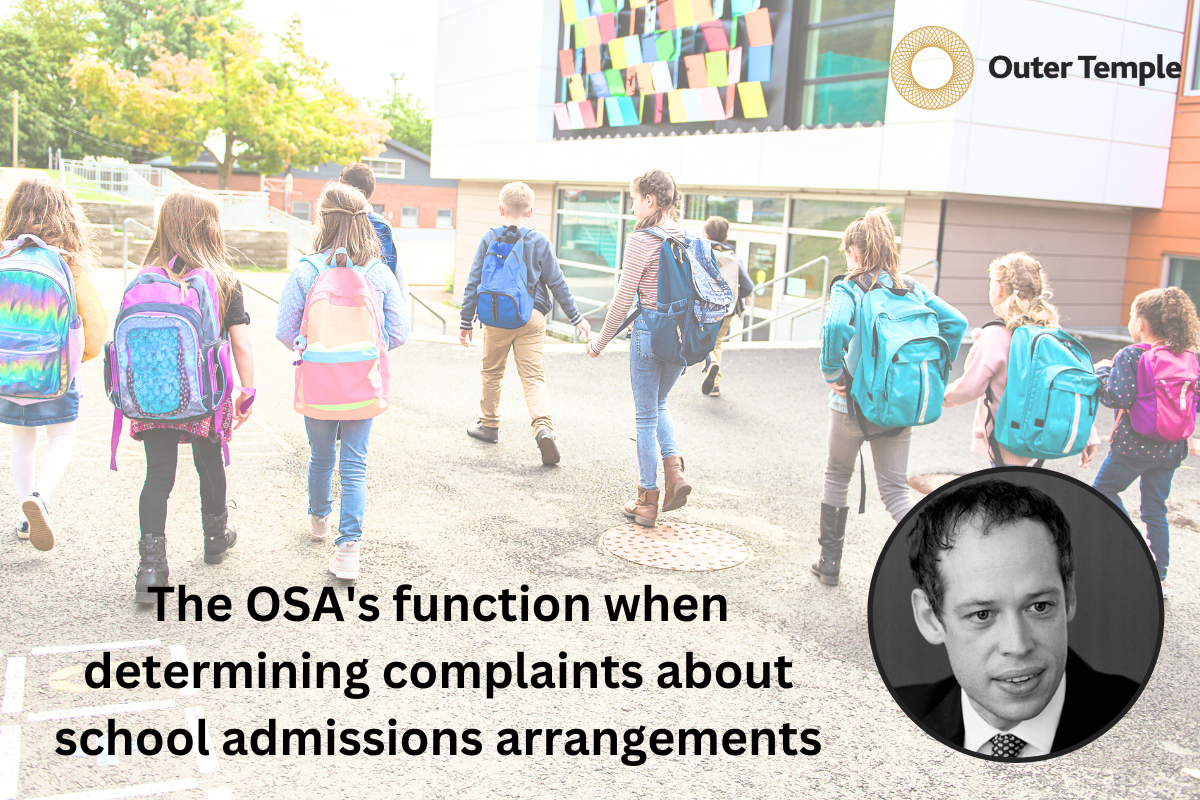Insights / News
Insights / News

Alex Line acted for the second Interested Party, London Borough of Bromley, in a judicial review that was brought against the OSA by Mr Sharpe. Another interested party, the Impact Multi Academy Trust (which was the admissions authority in relation to the schools considered in the case) was also involved. The Secretary of State for Education intervened. The decision can be viewed here: Robert Sharp, R (on the application of) v The Office of the Schools Adjudicator. The case, had it succeeded, would have had potentially very wide ranging practical ramifications for the current secondary admissions process in the Bromley area, affecting both intervenors.
In outline, the facts were as follows. The Trust responsible for a new primary school had made historic representations that the school would act as a feeder school to two popular secondary schools in Bromley. Parents who would most likely have failed to obtain places for their children at these secondary schools (due to distance criteria in the admissions arrangements) relied on these representations, and sent their children to the primary school so as to guarantee a pathway to the secondary schools. However, the Trust did not amend the admissions arrangements applicable to the secondary schools. When this cohort of pupils reached Year 6 and their parents needed to apply for secondary schools (a process which the second Interested Party administered), it was realised that the admissions arrangements did not reflect the representations previously made. Affected parents complained. The Trust consulted with the community about amendments to the admission arrangements which would facilitate preferential treatment for these pupils, but a clear majority of respondents objected. Therefore the changes were not made, meaning the affected pupils would not obtain places in the secondary schools. A number of parents exercised a right of complaint against the determined arrangements to the OSA. The OSA found that these parents had been treated unfairly, and that the unfairness could be remedied by permitting the inclusion of these pupils into the secondary schools through a limited increase to the schools’ Published Admission Number. The schools followed this recommendation. Mr Sharpe, who was dissatisfied with this decision, sought judicial review of it.
The case is of note because, in addition to providing a summary of the law of the approach to be taken in relation to judicial review challenges against OSA decisions, it considers what is meant by the concept of ‘fairness’ in admissions arrangements, and the OSA’s role in the assessment of fairness. In relation to this, the High Court (amongst other points) gave the following guidance:
“… “fairness” is not defined. That is not a defect in the system: it simply means that the word, and the concept, bear their ordinary meaning rather than a meaning delimited by the legislation. No doubt fairness is not easy to define. It is, as Lord Wilson remarked, speaking of procedural fairness, in R (Moseley) v London Borough of Haringey [2014] UKSC 56 at [24], “a protean concept, not susceptible of much generalised enlargement”. It seems to me that an assessment of fairness will have at least the following two features. First, it will respond to claims based on facts and perceptions that have a variety of levels of objective recognition and may sometimes have to take into account considerations that are wholly subjective. Secondly, it will not take into account only the position of those who object to a particular arrangement and claim it is unfair to them but will balance those claims against other claims actual or possible in order to reach a solution that has a measure of equality.”
The Court rejected all challenges made to the OSA’s decision, therefore the adverse implications of a successful challenge to the Interested Parties did not arise. The decision confirms the broad nature of the OSA’s decision making remit in this regard, which is likely to be of importance if challenges are made in relation to the treatment and assessment of ‘fairness’ by the OSA in future cases.
Alex Line specialises in education law and has been ranked in both Chambers and Partners and Legal 500 for several years in relation to this area. His work encompasses the full spectrum of education law, including: special educational needs, admissions, exclusions, safeguarding, discrimination, civil and public law claims concerning schools, colleges and universities. He acts for individuals, local authorities, and education institutions alike. He is also well placed to assist with public law cases affecting these and associated areas.
Alex has High Court, Employment Appeal Tribunal, Upper Tribunal, and Court of Appeal experience. He has been appointed to the Attorney General’s panel of counsel to the Crown (B Panel) and the Equality and Human Rights Commission’s panel of counsel (B Panel).
News 26 May, 2023